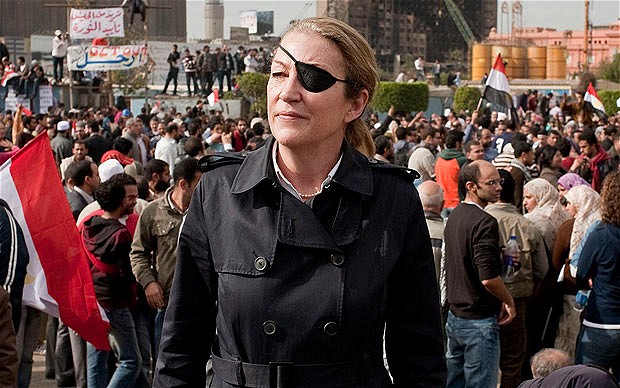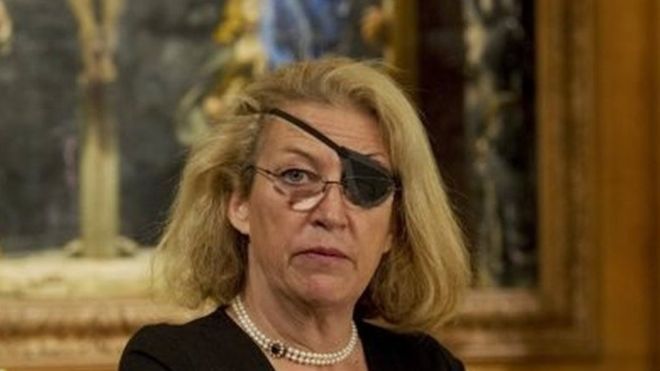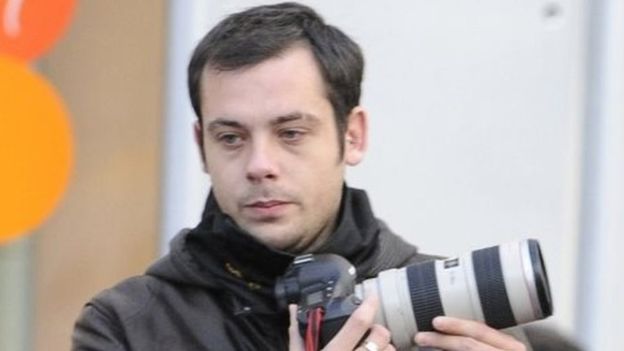Marie Colvin’s family sues Syria over death in Homs

The family of Marie Colvin, the American journalist who died in Syria four years ago, is suing the regime of President Bashar al-Assad.
Relatives say they have evidence that she was murdered as part of a policy of deliberately killing journalists.
The wrongful death lawsuit was filed at a district court in Washington DC.
Colvin was reporting from the rebel-held area of Baba Amr, in Homs, in February 2012, when she was killed by government artillery.
Shortly before, she did live broadcasts for the BBC, Channel Four and CNN.
"I watched a little baby die today," she said, talking over pictures of a child who had been hit by a sniper bullet. "That is happening over and over and over."
She told the BBC that President Assad's forces were "shelling with impunity, with merciless disregard for civilians".
She told CNN it was "a complete and utter lie that they're only going after terrorists… The Syrian army is simply shelling a city of cold, starving civilians".
'Intercepted transmissions'
The Colvin family believes that the satellite phone used in these broadcasts was traced by Syrian intelligence and used to locate the Baba Amr media centre, where she was based.
According to documents obtained by their lawyers, a government informant then confirmed the location. An attack on the journalists was ordered that night, the lawsuit says.
"The transmissions were intercepted, and they were tracked to their GPS co-ordinates," said one of the legal team, Scott Gilmore.
"On top of that there was a whole web of informants who were already out searching for the journalists. Any journalist in Homs… could have been a target".
Marie's photographer, Paul Conroy, had told the BBC shortly after the attack that the incoming rounds were "bracketed" on the media centre, meaning they were being deliberately targeted.
Conroy had served in an artillery regiment in the British Army.
"As an artilleryman, I think that was a good day's work for a for a well-trained team. Nothing smacked of randomness in that situation," he said.
Now the family's lawyers say they have witnesses and documents smuggled out of Syria to prove this.
'We know killers'

The lawsuit is the fruit of four years of research by the US-based Center for Justice and Accountability.
The documents are said to show that the artillery strike was approved or ordered by President Assad's brother Maher, commander of the Republican Guards.
The policy of targeting journalists is alleged to have been made by senior officials in the Central Crisis Management Cell, President Assad's war cabinet.
"I'm really proud to be able to bring this lawsuit," said Marie Colvin's sister, Cat. "We know who Marie's killers are now; we want them brought to justice. I want them to be held accountable."
She went on: "I'm very sensitive to the suffering of the Syrian people. I know I'm not the only one who's lost a sister and my mom is not the only one who is mourning the loss of a daughter.
"I'm in a unique position to be able to use the court to be able be bring Marie's killers to justice. I want to give a voice to the Syrian people. I want them to know we haven't forgotten them."
At the scene — Baba Amr media centre before the attack that killed Marie Colvin
The shelling in Baba Amr was the most intense any of us in the BBC team had ever seen.
The Syrians there were all wondering if this would be another Hama — the town destroyed by the old President Assad's artillery in 1982. Some 10,000-20,000 people were killed — there is still no accurate estimate — but not a single image was published of the carnage.
In the age of the cameraphone and YouTube, that was not going to happen in Baba Amr.
But — we believed — the regime still feared what effect the presence of international journalists would have.
"We could destroy Baba Amr in 10 minutes, if there were no cameras," a regime official is supposed to have said, according to documents and witness statements obtained by the Colvin family's lawyers.
The lawsuit says Marie was deliberately murdered according to orders given by some of the most senior officials in the Syrian regime.
One of those who helped carry out the attack is said to have been rewarded by the Assad family with the gift of a car.
These are allegations, yet to be tested in court. But the murder of journalists is just one war crime among many of which the regime stands accused.
The Colvin family hopes the lawsuit will be a reminder of that — as some in the international community seek to rehabilitate President Assad.
Политика конфиденциальности | Правила пользования сайтом









